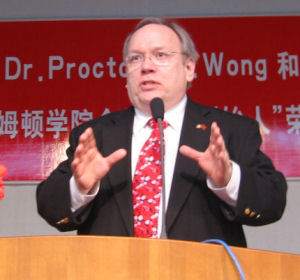
|
| EMAIL GROVER |
|
Learning Business the American Way: Northwood-China Partnership Teaches Business the American Way by Mónica Guzmán, Midland Daily News, May 11, 2006 | ||
|
Nice, but a little crazy. That's what 22-year-old Dan Liu, a Chinese native, thinks about Americans, now that she's lived and studied among them at Northwood University for a year. "It's been a good experience. I'm glad I came," Liu said. And Dr. Grover Proctor made it all possible. For that, he got a Chinese name, a pretty cool plaque and the honor of being named co-founder of a university halfway around the world. Grinning from above his tie, which tells the story of the Buddha in Chinese characters, the good doctor acknowledged that even after several years of travel, he doesn't know a bit of Mandarin, the language spoken by Liu and every other student to whom he will hand a diploma at Jilin-Lambton University in Changchun, China.
|

| |
|
But he's gotten to know the most populous country in the world anyway, well enough to know how selectively that culture bestows titles. "Usually I can talk with great glibness about anything, but I haven't found the words to describe this," said Proctor, the school's associate dean of academic administration. Proctor and three administrators from Canadian schools in the partnership that launched the young Chinese school were recognized for their work at a ceremony in Changchun last month. The first graduating class in the business school had 64 students. This year, more than 300 students are expected to graduate from Northwood's Chinese programs in the fall. Students have the choice of taking the North American-style business classes in China or going to Lambton University in Canada their third year and Northwood -- which joined the partnership in 1999 to complete the requirements for a bachelor's degree -- their fourth year. Jilin-Lambton University, founded in 1997, receives much of its support from Jilin University in Changchun, the largest university in the country by student population. Despite its North American influence, the new school is run entirely by the Chinese -- a big plus for the country's strict, still Communistic leaders. "The central government in China, which controls the quality of education, very early on learned about this particular type of venture and loved it," Proctor said. Surprising, considering the country's vastly different politics, Proctor said. All courses are given in English with English-language textbooks that use the principles of North American business. American political values don't mesh well with Chinese, but an education in free market perspectives, not to mention the immersion in such a globalized language, are a big draw for Chinese students who want a leg up in a global business world and a country that wants to have a bigger say in global trade. Even if coming over is a bit of a culture shock. As one of the eight Jilin-Lambton University students who chose to come to Northwood for their fourth year last fall, Liu admits she felt a little out of place in Midland's stillness. Changchun is a city of 7 million, after all. She was more shocked to find that students here hit the parties as hard as the books, and wished there were more of a support system to help Chinese students adjust. Proctor said the Chinese students have become a part of the "fabric of diversity" in the school, which boasts a student population hailing from 68 countries. As for next year, Proctor said, 22 Chinese students at Jilin-Lambton and a similar program at a similar program at another university are getting ready to do their senior year the American way. Since the program's launch, Northwood established similar partnerships in Switzerland and Sri Lanka, with another planned for Malaysia and set to start as early as next year. Northwood is turning global. And global is good, said Dr. Robert Serum, who oversees international programs. "There's a lot of interest in American business. That will surely change in the future," he said. "We'd like to be on both sides of the equation with our students. We'd like them to gain from other cultures, and other cultures to gain from theirs." Though Mandarin remains a mystery to Proctor -- other than "how to say hello to a panda on the Great Wall" -- he can give flair to the name officials there gave him, Ge Le Hua, or "Happy China." "Because I'm not only happy in China, but I brought happiness to China," he said. | ||